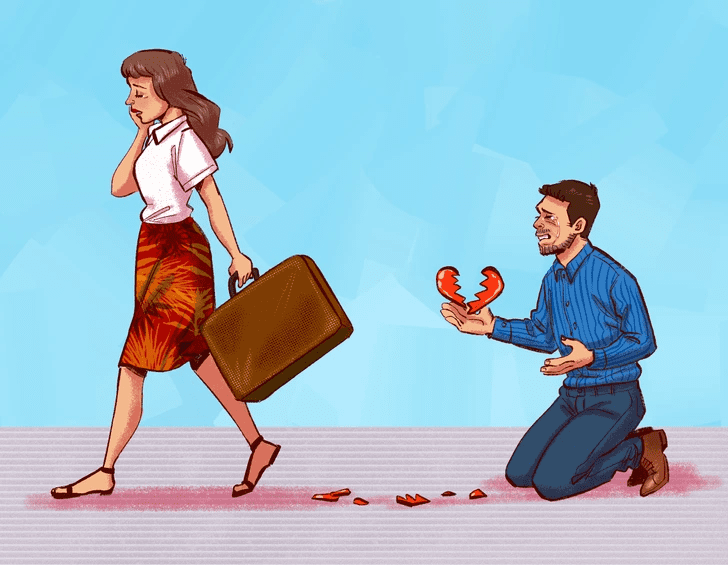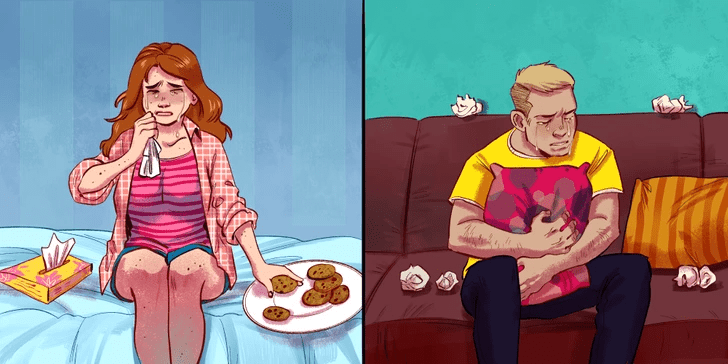Breakups are universally tough, often leaving people reeling from emotional pain. While it’s commonly believed that women are more affected by breakups, recent studies reveal that men may actually experience more profound emotional distress. Why is that? The answer lies in a combination of psychological, societal, and emotional factors that shape how men cope with heartbreak. Let’s dive into why breakups tend to hit men harder and how they can navigate the path to healing.
Men and Emotional Vulnerability: A Silent Struggle

From childhood, men are often conditioned to suppress their emotions. Society consistently tells them that showing vulnerability equates to weakness. Women, on the other hand, are typically encouraged to express their feelings and seek support from friends or family. This emotional suppression becomes deeply ingrained, making it challenging for men to openly discuss their feelings.
When a breakup occurs, men may find themselves without a strong support system. Since many men rely on their romantic partners as their primary source of emotional support, the end of the relationship can leave them feeling abandoned and alone. This lack of an emotional outlet can lead to lingering sadness, loneliness, and even depression—often much more intensely than women experience.
Video:
Men May Get Hurt More Than Women During a Breakup, and Here’s Why
Societal Expectations: The Pressure to “Man Up”
Society imposes a considerable burden on men to “man up” and move on quickly after a breakup. They are expected to demonstrate emotional resilience, while women are more readily accepted when expressing grief or sadness. This expectation often prevents men from processing their emotions properly.
Instead of confronting their feelings, men might resort to distractions such as excessive work, alcohol, or casual relationships to maintain the appearance of strength. Unfortunately, these coping mechanisms only mask the pain temporarily, causing unresolved emotions to resurface later.
Why Romantic Relationships Matter More to Men
Men and women often approach relationships differently. Women generally cultivate multiple sources of emotional support through friendships and family connections. Men, however, frequently depend solely on their romantic partners for emotional intimacy and support.
When that bond is broken, it’s not just the loss of a girlfriend or wife—it’s the loss of a best friend, confidant, and primary emotional anchor. This profound sense of loss can make a breakup feel like a double blow, intensifying feelings of loneliness and emotional isolation.
Delayed Grief: Why Men Take Longer to Heal

While women tend to process emotional pain more immediately and actively seek closure, men often delay facing their emotions. They may initially focus on distractions—hobbies, work, or new relationships—rather than acknowledging their heartbreak.
However, unresolved feelings rarely vanish. Instead, they build up and may resurface as depression, anxiety, or a persistent sense of emptiness. This delayed emotional response means that men may take significantly longer to heal compared to women, who typically confront their feelings early on.
Attachment Styles: How They Affect Breakup Pain
Attachment styles play a crucial role in how individuals handle breakups. Men are statistically more likely to have an avoidant attachment style, meaning they struggle with emotional closeness but still feel deeply affected when a relationship ends.
This paradox can lead to conflicting reactions. On one side, men may appear indifferent, trying to suppress their sadness. On the other, they may internally battle heartbreak and struggle to move on. In contrast, women often have secure or anxious attachment styles, making them more inclined to confront and discuss their emotions.
Romanticizing the Past: Why Men Struggle to Move On

Men often romanticize past relationships, focusing on the good memories and minimizing the reasons for the breakup. They may cling to nostalgia, replaying moments of happiness and ignoring the relationship’s flaws.
Women, on the other hand, are more likely to evaluate why the relationship ended, helping them gain clarity and closure. Men’s tendency to idealize the past can create a cycle of regret and longing, trapping them in emotional turmoil long after the breakup.
The Physical Toll of Breakups on Men
Heartbreak doesn’t just affect emotions—it also impacts physical well-being. Men are more likely than women to experience physical symptoms post-breakup, including:
Video:
Men vs Women in a Breakup: Who Suffers More?
- Sleep disturbances: Insomnia or excessive sleeping.
- Appetite changes: Weight loss or gain.
- Weakened immune system: Increased stress can lead to illnesses.
- Risky behaviors: Excessive drinking, smoking, or reckless actions.
These physical effects often stem from unaddressed emotional pain. Since men are less likely to seek help, stress can compound, leading to long-term health problems.
Why Women Heal Faster
Women generally employ healthier coping mechanisms when dealing with breakups. They are more inclined to:
- Talk openly with friends and family.
- Seek professional help, such as therapy.
- Engage in self-care practices like exercise or journaling.
- Reflect on the relationship to understand what went wrong.
These methods allow women to process their emotions more effectively, leading to quicker recovery. In contrast, men’s avoidance tactics prolong their suffering and hinder personal growth.
How Men Can Heal After a Breakup

If breakups hit men harder, what can they do to move forward and heal?
- Acknowledge Your Emotions: It’s okay to feel sad, confused, or angry. Accepting your emotions rather than suppressing them is crucial for healing.
- Open Up: Talk to someone you trust—a friend, family member, or therapist. Sharing your feelings helps release the emotional weight.
- Focus on Self-Care: Maintain a healthy routine with balanced meals, physical activity, and proper sleep to support mental and physical well-being.
- Stay Productive, But Avoid Numbing the Pain: New hobbies can be helpful, but don’t use them solely as an escape from emotions.
- Reflect and Learn: Use this experience to understand your needs and grow from the past. It’s a chance for personal development, not just loss.
Healing after a breakup is a journey, but embracing vulnerability and seeking support can make it a path to self-discovery rather than prolonged pain.
Conclusion: Understanding Men’s Emotional Pain After Breakups
Breakups are undeniably challenging for everyone, but men may face additional obstacles due to societal norms, emotional suppression, and a lack of coping strategies. Their tendency to delay processing emotions and romanticize past relationships can make the healing process significantly harder.
However, by recognizing these challenges and adopting healthier coping mechanisms, men can overcome heartbreak and emerge stronger. Healing is not just about moving on—it’s about rediscovering oneself, learning valuable lessons, and preparing for healthier, more fulfilling relationships in the future.


